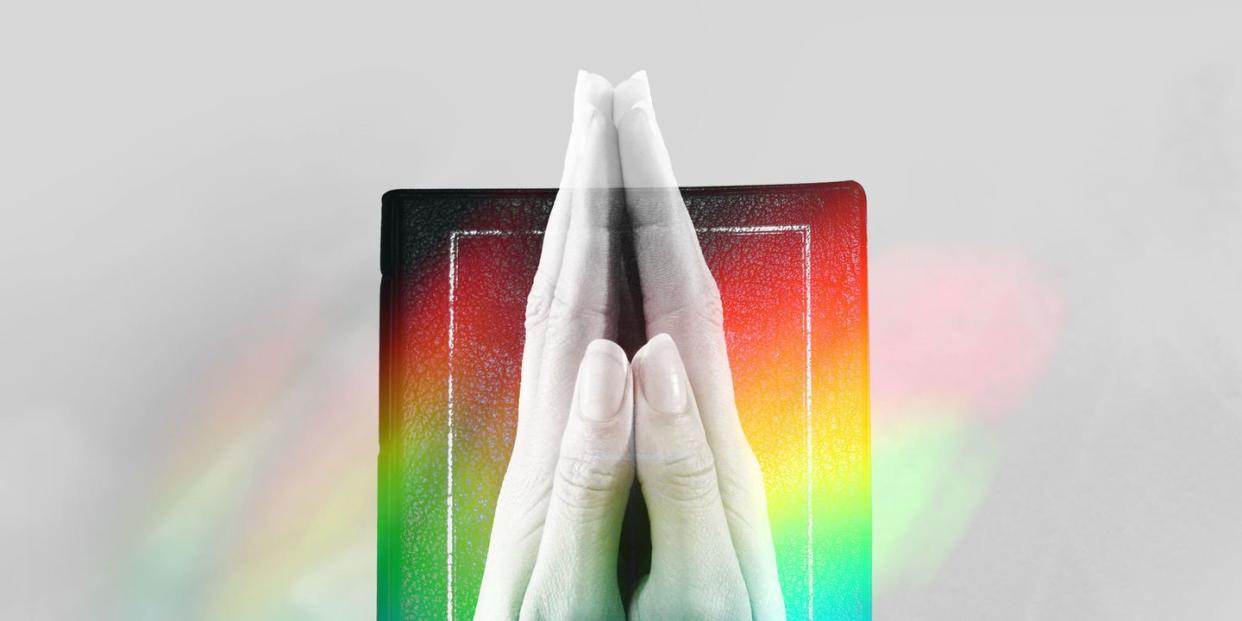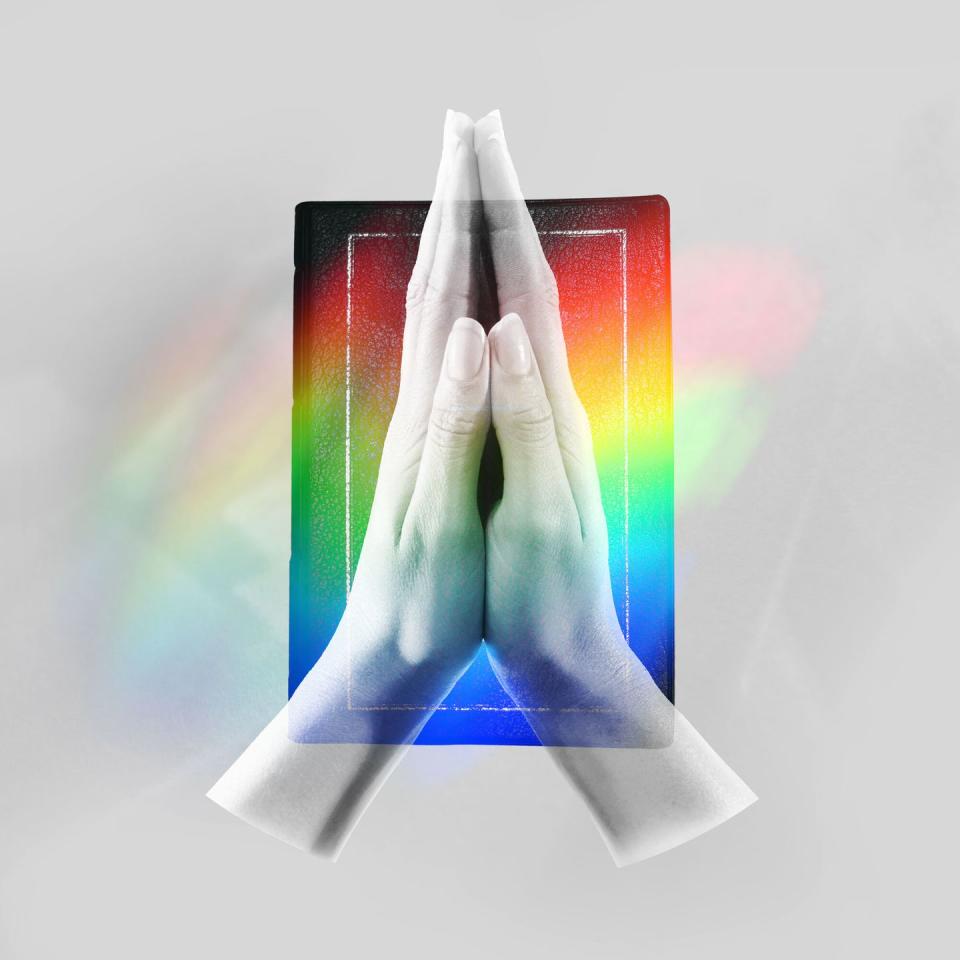After I Came Out, My Mother Left Our Church to Fight for Queer Youth


Growing up in the Pentecostal church, I understood acutely that to be a follower of Jesus Christ was to live in fear. Of a mighty and jealous power too big to name. Of the desires of my body. Of dishonoring my parents—or more specifically, in my case, my mother. The alternative to this course was death.
I mean no hyperbole. To step outside the parameters of my “reasonable service, holy and acceptable,” I was taught, carried with it the most dire consequences. Not only would I be bound to hell in the afterlife, I would be bound to alienation in my life on earth. “You’re either clean or you’re dirty,” the pastor would boom from the pulpit each Sunday. “You’re either in or you’re out.”
For years, I watched those who disobeyed the edict be cast out, discarded. One Sunday, when I was no older than 10, the pastor pointed to a small-framed woman tucked into the corner of an innocuous middle pew during his sermon. I loved sitting near her during service. She had a raspy voice that reminded me of the scratch of old records and was quick to crack a joke under her breath. But she was about to be the grandmother to a baby born out of wedlock, and worse, to a teen pregnancy. And despite my affection for her, I knew this wouldn’t stand.
The pastor had already sent her child out of the sanctuary that morning. He wouldn’t stand to have the house of God defiled by such a sight. Soon after, he demanded she choose: the church or her family. He quoted from Amos: “How could two walk together except they be agreed?”
She left, eyes watering but defiant, and never looked back. As we drove home that day, the car was silent. Not even the local gospel station played over the radio. My mother, the person whom I’d always regarded as my spiritual guide, said nothing. I knew we were all reckoning with the same truth. The bible told us that the wages of sin was death, and a social death was a small price to pay in the now. One day, we would all be held accountable to God for the vows we’d made.
Watching her exodus was a reminder of the highest order: There is no law, no woman, greater than that of the word of God.
The church has always been an anchor for my family in a world that left us unmoored. In the wake of my parents’ divorce, it was the church that wrapped its arms around us and offered us warmth. It gave my mom a renewed purpose, in working with the children’s ministry and eventually in studying to become certified as an evangelist missionary. The church was the body for which we were able to be hands and feet, running and reaching for something greater than the life we currently had.
But in the years after high school—when I was left to find my own spiritual practice without the umbrella of my family’s church and the faith tradition that raised me—I had my doubts. Not of God, but my relationship to him. I wasn’t able to put a name to my queerness then, but I knew with a startling clarity that I was no longer the type of woman, the type of daughter, the type of good Pentecostal girl I was raised to be. And the stakes of that failure hadn’t changed.
When I fled to New York for grad school, I wasn’t able to flee the specter of that tearful girl watching her pew companion expelled from the church. I dated women, fell in love with one, got my heart broken by one, and still, the self-loathing remained. I was bound by my fear. I couldn’t be fixed, I knew, but maybe if I prayed harder, read the Bible more, I would become worthy of love, of life, in spite of my burgeoning queerness.
I’m not sure there’s a way to fully emerge from the other side of that type of trauma, but there is a way to break the surface of the water that baptized you in shame. It wasn’t until I came out to my mom that I began to feel free.
Since I’d left home, my mom’s spiritual journey had carried her away from the church I’d been raised in as well. The world, her world, was changing faster than the doctrine could keep up with, and she needed a church home that reflected that progress. She found a new house of worship, with a more liberal pastor and a younger, more vibrant congregation. The way they interpreted the Bible was different. It was a gospel of love, of uplift, of radical joy.
When I came out to her, she didn’t understand everything about my queerness, but she knew enough to love me. She knew enough to take to Facebook to defend me against the trolls who would come at me when my first book—a queer YA novel about a Black girl from Indiana—was published. She knew enough to use her Bible to immerse us both in acceptance instead of hate. And she knew enough to hold my hand in the shadowy early-morning hours when I still wept for the life I thought I’d lost.
This past November, my mom was elected to state representative in our hometown. It’s a far cry from the single mom of four she used to be, fighting through the barriers of poverty and clinging to scripture for answers when the world had none to offer. Her proposed legislation ran the gamut from protecting families with children from having their utilities cut off to proposing that incarcerated women not be bound in chains when they give birth. She spends all night researching and all day on the phone. Taking meetings, asking questions, answering some herself.
“Have you heard of conversion therapy?” she asked me over dinner recently, as Jeopardy! played low in the background. She was set to begin her first legislative session the next day. “You wouldn’t believe what they do to these kids.”
I didn’t mention the things I would believe. I didn’t mention the things I once considered for myself—the things I was willing to do to maintain her love and the love of God.
“I’ve read about it. It’s terrible.”
“More than terrible, it’s cruel,” she replied. The stats she cited were stark: Seventy-eight percent of those who undergo conversion therapy are minors. And the minors in conversion therapy are twice as likely to attempt suicide than queer youth who aren’t. I could see the fabric stitching together as we spoke, the truth of who we used to be but never named. Death, for some of these families, is preferable to queerness.
Death, for some of these families, is the law of God, and there’s nothing higher than that.
Indiana is by no means a progressive place, but it’s full of fighters—of democratic legislators taking on the uphill battle for dignity and justice for a people still considered fringe in too many of the towns that make up our red state. In the statehouse, they present bills that get voted down before even making it to the floor. Bills like the one my mom is advocating for now, which would ban conversion therapy in Indiana.
“It shouldn’t have taken this long,” she says now, face focused. Another congressperson, a second-term state representative—the first queer person ever elected to the Indiana General Assembly—who authored the bill, has been keeping her up to speed on the history of this type of policy in the state. On what type of support she can offer. “I’ll do whatever it takes.”
She repeats, “It never should have taken this long.”
I watch as my mom logs into a Zoom meeting with conversion therapy survivors, queer trauma therapists, and other Democrats supporting the bill. Her laptop is balanced on a stack of books; the thick, leather-bound King James Bible I once revered and loathed in equal measure sitting directly underneath her signed copy of Becoming. I run my hand over the dusty framed photo of me at six, dressed and ready for church, unaware of the possibility for a life unmarried from fear.
I leave the room and listen to my mom’s voice among the litany of queer Hoosiers, resilient and unbowed, through the wall.
You Might Also Like

